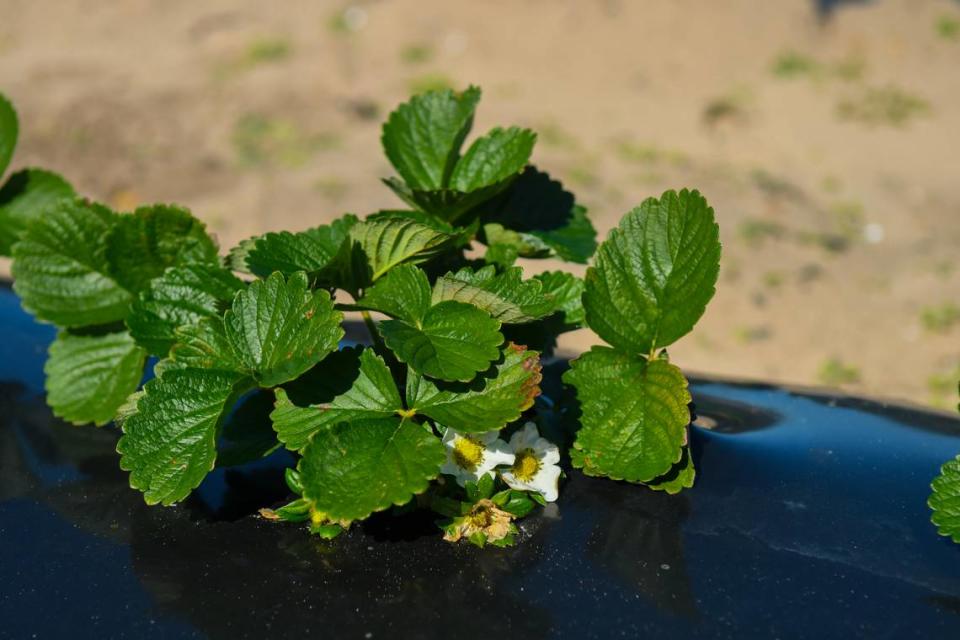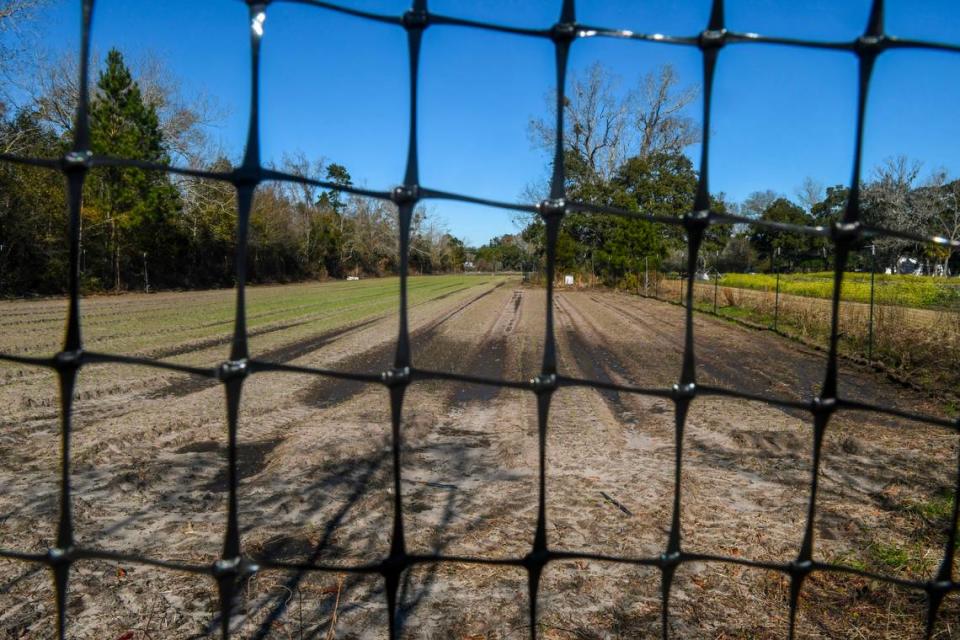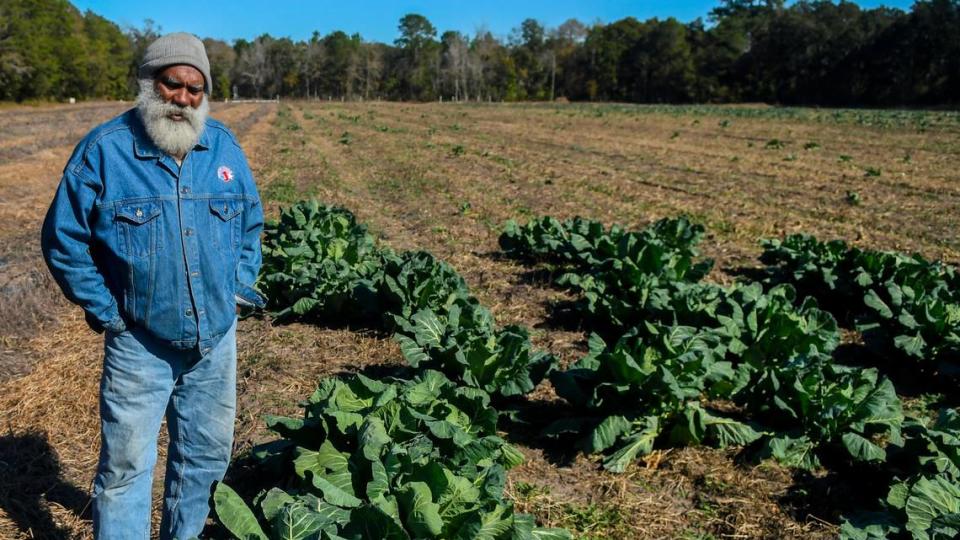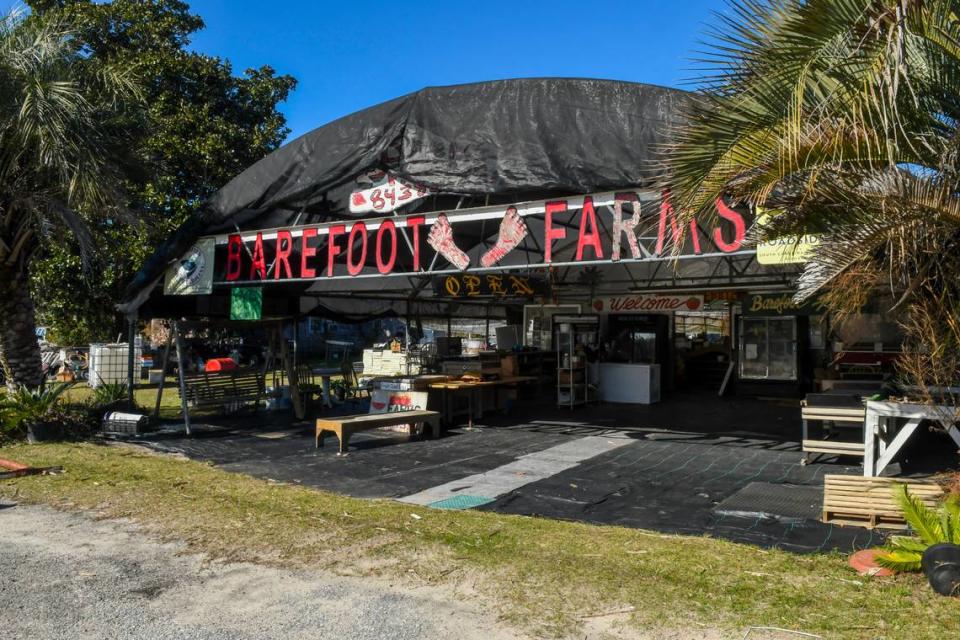Never mind the chill, St. Helena’s barefoot farmer is still planting and picking at 74.
Last summer’s peach shortage due to a spring frost is leading many grocery buyers to wonder what this weekend’s unusually low temperatures will do to local produce supplies and prices. According to one local, often barefoot farmer who has seen a few decades of planting and harvesting cycles, his crops will be fine.
It’s a frigid January day as Jacky Frazier looks over thousands of strawberry plants at his vegetable farm on St. Helena Island. A stocking cap covers his head but it’s unusual to see Frazier wearing shoes, even in the winter.
The cold weather has nothing to do with it. Frazier, who prefers going shoeless even when he’s driving a tractor, lifting produce or chatting with his customers, recently underwent hernia surgery and decided to slip into some crocs as a precaution until he fully recovers.
The barefoot Frazier, one of St. Helena’s most recognizable vegetable farmers, owns the appropriately-named Barefoot Farms on Sea Island Parkway. Seen daily by thousands of commuters, it’s part of the natural scenery during the drive between Beaufort and Fripp Island, just like marsh grass and water. For decades, residents have been stopping here to pick their own sweet tasting strawberries, honeydew melons and collard greens, the official vegetable of South Carolina.
Even the sign in front of the business is iconic. It features distinctive red letters with the name of Frazier’s business — Barefoot Farms — along with the outline of two big feet. Some call it the “bigfoot sign.”
“I don’t wear shoes,” says Frazier simply, explaining how he came up with the name when he began the business 30 years ago. “I just like being barefooted.”
Frazier, a former cotton and soybean farmer who is originally from Allendale County, began selling what he was growing directly to his customers out of necessity. He was growing produce but couldn’t find buyers. He opened his fields and let people pick their own strawberries. He included a roadside stand to sell other fruits and vegetables. The location was Sea Island Parkway, which today is teeming with traffic and commuters. Frazier named it Barefoot Farms.
Compared to larger farms on St. Helena Island, Frazier says, “I’m a gardener.”
But in the four decades since he began working the land on St. Helena, his 50-acre plus farm has developed a reputation for the quality and freshness of its products, even drawing customers from as far away as Savannah and Atlanta. Customers, Frazier says, “especially like our strawberries.”
“We have a saying, ‘know your farmer and know your food,” Frazier said. “We don’t sell nothing we wouldn’t eat.”
Almost 20% of the farm’s 50 acres is devoted to strawberries, making it a major crop at the farms, which are spread across multiple plots in the vicinity. One strawberry plant alone can produce 1.5 to 2 pounds of berries, Frazier says. Some 90 percent of the strawberries are picked by customers.
In November, each plant — there’s 12,000 per acre — was carefully inserted — by hand — 3 inches into the soil, 12 inches apart.
This time of year, Barefoot Farms is closed to the public but plants are in the ground and there’s still work to do. Wearing his temporary footwear, Frazier walks as he surveys row-upon-row of strawberry plants, which are currently dormant. Their green leaves are striking against the black covering that protects them. It’s around 40 degrees and Frazier jokes that even the Lowcountry’s notorious biting bugs are looking for places to stay warm.
But it’s not the below-normal winter temperatures with lows that have dipped well below freezing that are making the blood run cold for the 74-year-old farmer with a beard that has long since turned as white as snow. Strawberries actually need chilly weather this time of year so they do not bloom early, Frazier notes. The cold now will also help control the insects.
As for his collard greens and onions, they are hardy enough to survive the freeze. The threat that keeps Frazier up at night is lurking in the trees and marshes that surround his farm.

“Our biggest problem is not the weather,” Frazier says. “It’s the deer.”
The hungry ungulates have been ravaging Frazier’s fruit and vegetables, gobbling up his profits. He’s been forced recently to invest thousands of dollars in new fencing to keep the deer at bay. Last year, a frustrated Frazier says, they took 75 percent of his crops including every strawberry. “Deer ate ‘em all,” says Frazier.
When the farm went to drip irrigation, that solved many of the weather-related issues, such as drought, Frazier said. Then the deer came along. “We can’t afford not to fence it,” he says of his crops.
Frazier has a theory about what’s causing the deer to invade. With new houses going up across the area, he suspects more deer are finding refuge on what open land remains — like his farm fields.

Onions, tomatoes, cantaloupe, sweet corn, cucumbers, watermelons, honeydew melons and other vegetables are for sale too at Barefoot Farms, not just strawberries.
“You name it,” says Frazier, “we plant it.”
He stoops down to feel the broad floppy leaf of a collard green planted in September. Harvesting has been continuous since November, with Frazier cutting the collards to fill orders.
“The cold don’t do any damage,” he says. “Collards is a cold weather crop. It can burn the leaves but they’ll grow through the winter. It don’t kill ‘em.”
Frazier raises honey bees to pollinate his vegetable crops.

Watermelons and honeydews will go in the ground in march. Onions were planted a few weeks ago. They will be ready by April 1. The onions, Frazier says, are called Barefoot sweets.
Frazier doesn’t sugarcoat his opinions.
He wouldn’t recommend farming to a younger person, for example.
“Like my Daddy told me,” Frazier says, ‘You can make a living a lot easier than farming.’”
He works seven days a week — and seven days and nights during some parts of the year.
“You have to fight with the deer at night,” Frazier says with a laugh. “Fight with the bugs during the day.”
And being a Black farmer, he adds, carries added burdens, like lower prices and higher costs for inputs.
“Same ol’ status quo,” Frazier says.

When asked if farming has provided a good living, Frazier says, “It’s a way of life. That’s the way I’d put it.”
A sign along the highway in front of Barefoot Farms advertises “Gyeens.” While the farm is closed to the public at this time of year, by the end of February or early March, customers will be pulling off of Sea Island Parkway in droves to pick the the luscious strawberries that Frazier grows.
“Barefoot Farms,” says Frazier, who does not own the land that he farms, “ends when I quit.”
He doesn’t know when that will be.

